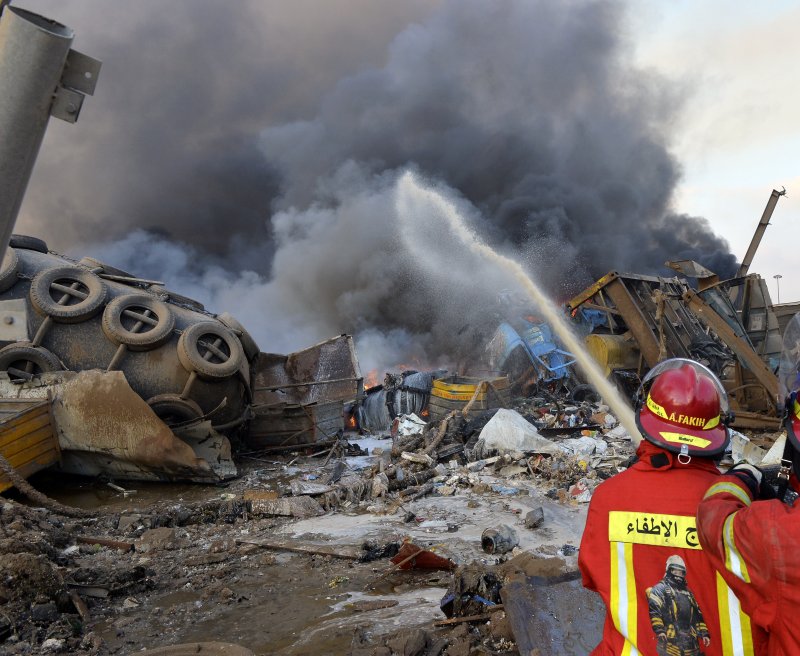1 of 2 | Firefighters try to extinguish flames after a large explosion rocked the harbor area of Beirut, Lebanon on Tuesday. Photo by Wael Hamzeh/EPA-EFE
Aug. 4 (UPI) -- Two explosions rocked the Lebanese capital of Beirut on Tuesday afternoon, shattering windows for miles across the city. Dozens were killed and thousands injured, local officials said.
Lebanese authorities said the blasts killed at least 78 people and injured more than 4,000. The Lebanese Red Cross said those numbers are likely to increase as the dust settles.
Authorities said a warehouse near Beirut's port was the source of the explosion after a fire started inside the building.
The secondary blast was larger, creating a shockwave that pushed through the city for a radius of miles, blowing out windows in its path. Lebanon's state-run National News Agency said the presidential palace sustained damage to windows and doors, though no one there was injured.
The cause of the fire was under investigation, but the Interior Ministry said stores of ammonium nitrate was likely to blame.
Lebanese Prime Minister Hassan Diab said the storage of ammonium nitrate at the warehouse was "unacceptable."
"I will not rest until we find those responsible for what happened, hold them accountable and impose maximum punishment," he said.
Officials initially suspected fireworks also stored in the area.
The Lebanese Red Cross said it dispatched every ambulance from throughout the region to the capital city to assist the injured. The New York Times reported that at least one hospital was overwhelmed and turning away patients.
The Red Cross also called for blood donations to help those injured in the blast.
The headquarters of former Prime Minister Saad Hariri was also damaged in the explosion.
The U.S. Embassy in Beirut issued an alert, calling on those in the area to stay indoors if possible and wear masks due to possible toxic gases in the air.
CNN reported that Nazar Najarian, the secretary-general of the Kataeb Party, died, citing local state-run media.
Diab declared Wednesday to be a national day of mourning and President Michel Aoun called for a two-week state of emergency and for an emergency cabinet meeting.
U.S. Secretary-General Antonio Guterres offered his condolences to those affected by the explosions.
"He wishes a speedy recovery to the injured, including several United Nations personnel working in Lebanon," a statement from his office said.
"The United Nations remains committed to supporting Lebanon at this difficult time, and is actively assisting in the response to this incident."
UNIFIL, the United Nation's interim force in the country, said the blast damaged one of its Maritime Task Force vessels docked in the Beirut Port and injured several naval peacekeepers, some seriously.
The injured were being transferred to the nearest hospitals, the mission said in a statement, adding it was still assessing the explosion's full impact to its situation.
"We are with the people and the government of Lebanon during this difficult time and stand ready to help and provide any assistance and support," said UNIFIL Head of Mission and Force Commander Maj. Gen. Del Col.
Ghada Alsharif, a reporter for the Daily Star, shared a video online of the newspaper's heavily damaged office. Alsharif called the explosion "massive." Homes as far as 6 miles away suffered damage from the blast. The force from the blast even flipped over some vehicles on streets.
The blast registered as a 3.3 magnitude earthquake in the Lebanese capital.
"What I felt was that it was an earthquake," resident Rania Masri told CNN. "The apartment shook horizontally and all of a sudden it felt like an explosion and the windows and doors burst open. The glass just broke. So many homes were damaged or destroyed."
U.S. Secretary of State Mike Pompeo offered condolences to all those affected and said the United States was monitoring the situation and was ready to assist Beruit with its recovery.
"Our team in Beirut has reported to me the extensive damage to a city and people that I hold dear, an additional challenge in a time of already deep crisis," he said in a statement, referring to the COVID-19 pandemic. "We understand that the government of Lebanon continues to investigate its cause and look forward to the outcome of those efforts."















